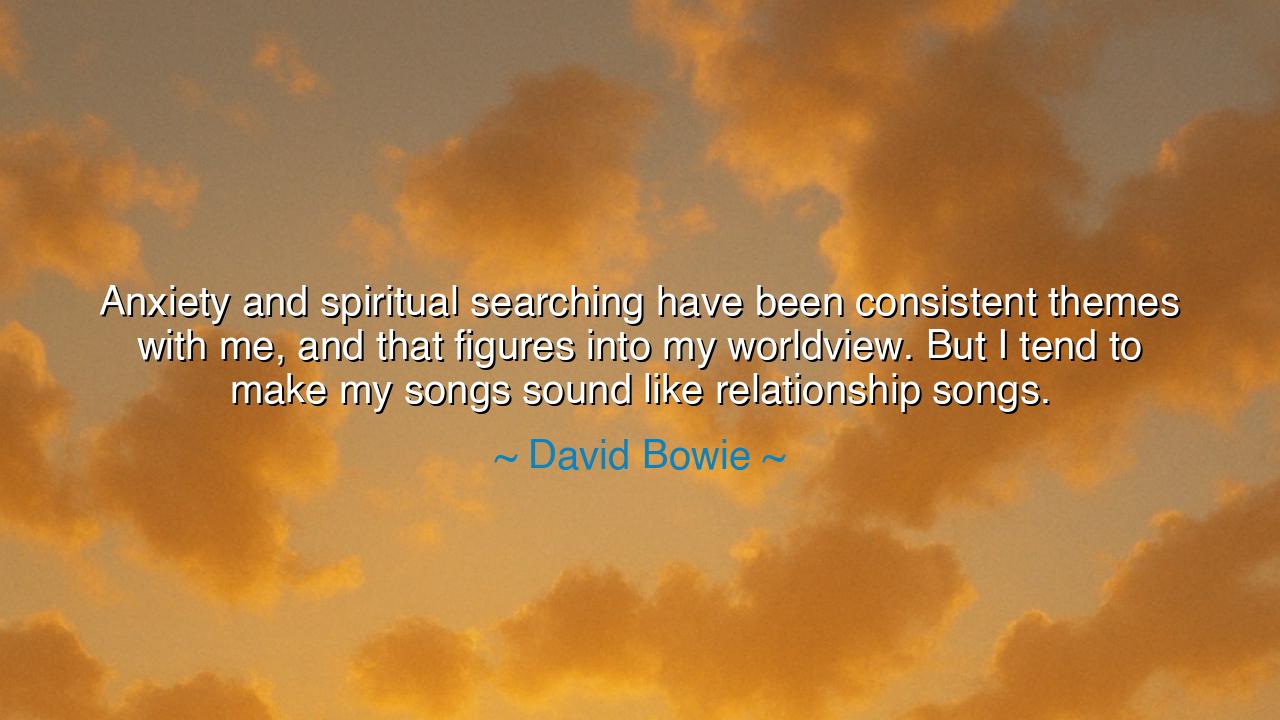
Anxiety and spiritual searching have been consistent themes with
Anxiety and spiritual searching have been consistent themes with me, and that figures into my worldview. But I tend to make my songs sound like relationship songs.






The chameleon of sound and vision, David Bowie, once revealed of his art: “Anxiety and spiritual searching have been consistent themes with me, and that figures into my worldview. But I tend to make my songs sound like relationship songs.” In these words lies the confession of a soul forever restless, forever reaching, one who clothed the eternal questions of existence in the familiar garments of love and longing. For anxiety and spiritual searching are the deepest fires of the human heart, yet they are often veiled in forms more easily understood.
Bowie speaks first of anxiety, that restless spirit which haunts every mortal life. It is the shadow that whispers of mortality, of identity, of the unknown beyond. To live is to wrestle with this unease, and for Bowie, it became not a burden to silence but a thread to weave into his art. In naming his fears, he transformed them into music, and through his songs, he taught others that their own trembling was shared.
Alongside anxiety he speaks of spiritual searching—the endless quest to grasp meaning in a universe that often conceals its face. This search has ever been the labor of prophets, poets, and wanderers: to pierce the veil, to find light amidst confusion. For Bowie, this search was not bound to creed or doctrine, but poured into melody, rhythm, and image. His worldview was shaped by this pursuit, each lyric a step along the path toward understanding.
Yet the genius of his craft was to disguise these vast themes in the intimacy of relationship songs. Love, heartbreak, desire—these are the universal languages, understood by all. By framing cosmic unrest in the language of human connection, Bowie built bridges between the personal and the eternal. The listener, hearing of passion or loss, unwittingly touched upon deeper mysteries—identity, mortality, transcendence.
So let this wisdom endure: the artist often hides the infinite within the ordinary, the spiritual within the romantic, the eternal within the fleeting. Bowie teaches us that songs are not only about lovers, but about the soul’s cry, the heart’s trembling before the abyss. To listen deeply is to hear not only the story of a relationship, but the song of humanity itself—anxious, searching, yet ever reaching for light.






MANguyen Mai Anh
Bowie’s words really highlight the power of music to transform complex, personal feelings into something that resonates universally. It’s intriguing how he views anxiety and spiritual searching as consistent themes in his life, yet these ideas are often conveyed through relationship songs. Does this mean that relationship songs are the best way to express deeper, more abstract themes, or is it just a tool he’s comfortable with to reach his audience?
PTTu Phuc Thanh
This quote from David Bowie is an insightful look at how personal experiences shape artistic expression. Anxiety and spiritual searching are powerful themes, but why does he choose to frame them through the lens of relationships? Does this choice make the songs more accessible, or does it dilute the deeper, more complex emotions he’s experiencing? I wonder if we can truly separate the personal from the universal in music.
NHNguyen Huy
Bowie’s admission about the blend of anxiety, spiritual searching, and relationship themes in his songs shows the complexity of his artistry. It makes me wonder—do artists consciously choose how they want their music to be perceived, or do these deeper personal themes emerge naturally in their work? How much of an artist’s inner turmoil is communicated directly, and how much is wrapped in metaphor, like in relationship songs?
TTTran Tran
David Bowie’s reflection on how anxiety and spiritual searching are central to his worldview yet expressed through relationship songs is fascinating. It makes me think about how artists often channel their personal struggles or deep thoughts into more universal themes. Is this a way of connecting with others who might not relate directly to the personal, but can still connect through the emotions of love and relationships?